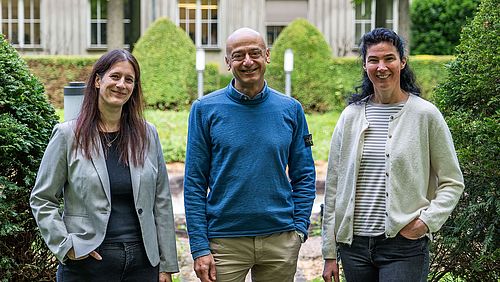5. May 2025
The PFOA-II study: innovative therapy for patellar osteoarthritis
The multicentre, randomised phase II PFOA II study is investigating the efficacy of a tissue-based transplant (N-TEC), which is grown from nasal cartilage, compared to standard therapy involving platelet-rich plasma (PRP), in patients with patellar osteoarthritis. The study's complexity and scope require close collaboration between numerous contributors and smooth coordination across multiple sites.
Innovative treatment method and complex study implementation
The treatment of patellar osteoarthritis (PFOA) is facing an interesting development: for the first time, an approach is being tested in a randomized controlled phase II study in which cartilage grown from the patient's own nasal cartilage cells (N-TEC) is used to restore the damaged joint surface. While previous treatment strategies have primarily focused on pain relief and symptomatic therapy, this method could contribute to the long-term regeneration of joint cartilage. Initial clinical studies provide promising indications of a structural improvement and a lasting reduction in pain.
The international, multi-center study, funded by the Swiss National Science Foundation as part of the Investigator-Initiated Clinical Trial Program, will involve 75 participants in 9 study centers in Switzerland, Germany and Croatia. They will be randomized and treated with either the N-TEC implant or a currently established standard therapy, the injection of platelet-rich plasma (PRP).
Implementing the study is very complex and labour-intensive, not least because of the complicated process of producing the N-TEC. During N-TEC treatment, a small piece of cartilage is first removed from the nasal septum on an outpatient basis. This is then prepared in a laboratory, multiplied, and combined with a biodegradable carrier material. Within four weeks, cartilage-like tissue is created and surgically inserted into the knee joint. Any concomitant causes of patellofemoral arthrosis, such as kneecap instability, are also corrected during the procedure. Intensive follow-up care involving close clinical and imaging checks (MRI and X-ray) as well as recording the patient's health status using patient-completed questionnaires over a period of 24 months ensures that the healing process is documented in detail.
In addition to the complex coordination work between the study centers, the N-TEC production sites and the laboratories, the project also collaborates with the DKF as a research partner. Project manager Anke Wixmerten from Prof. Ivan Martin's research group is responsible for all aspects of the project. The DKF takes on a number of tasks in the project with various services. A central element of the successful collaboration between the research group and the DKF is a permanent contact person at the DKF. Kristin Shrestha, Senior Specialist Regulatory Affairs at the DKF, acts as the central coordination point.

"Our close collaboration with the DKF is a huge relief. We no longer have to worry about coordinating the individual services — Kristin Shrestha takes care of that for us. This enables us to focus entirely on our core task of the academic implementation of the study."
Anke Wixmerten, Project Manager PFOA-II from the research group of Prof. Ivan Martin
Central coordination in multicenter studies
In complex, multi-center studies such as the PFOA II study, a central coordinator is particularly important. The DKF provides clinical research units with a wide range of services that are essential for the successful conduct of clinical studies - including data management, statistics, clinical monitoring, regulatory support and quality management. The central contact person coordinates these academic achievements, ensures that everything runs smoothly, promotes the exchange of information and identifies potential risks at an early stage. The successful conduct of studies depends to a large extent on centralized control and well-coordinated collaboration between all parties involved.
"I act as the main point of contact between the research group and the DKF teams. This eases the administrative burden on the researchers, establishes clear communication channels, and allows us to respond to challenges quickly."
Kristin Shrestha, Senior Co-worker Regulatory Affairs DKF

Kristin Shrestha (DKF), Prof. Dr. Ivan Martin, Anke Wixmerten
PFOA II study
Treatment of patellofemoral osteoarthritis with nasal chondrocyte-based engineered cartilage (N-TEC) implantation in a randomized, controlled, multi-center phase II clinical trial
Lead
Prof. Dr. Ivan Martin, Director of the Department of Biomedicine (DBM), Research Group Leader "Tissue Engineering" (DBM), DKF Research Group Leader
PD Dr. med. Marcus Mumme, Sportclinic Zurich Hirslanden, Tissue Engineering Research Group (DBM)
Prof. Dr. Andrea Barbero, Head of the Cartilage Engineering Research Group (DBM)
Study design
International, multicenter, randomized, controlled phase II study
Study centers
6 in Switzerland, 2 in Germany, 1 in Croatia
Number of study participants
75
Project duration
5 years
Supported by the DKF through
Data management, data analysis/statistics, data science, communication, monitoring, project management, quality management, regulatory affairs
Funding
SNSF IICT
